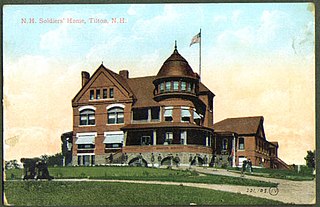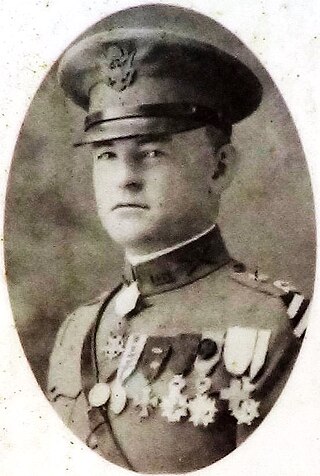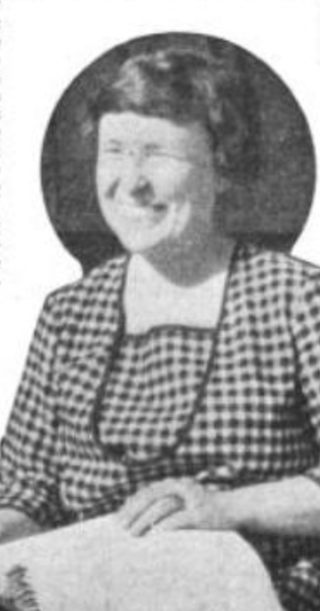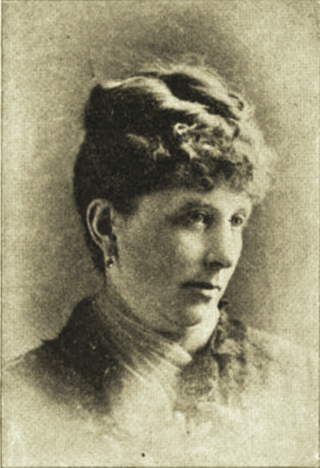
Napa County is a county north of San Pablo Bay located in the northern portion of the U.S. state of California. As of the 2020 census, the population was 138,019. The county seat is the City of Napa. Napa County was one of the original counties of California, created in 1850 at the time of statehood. Parts of the county's territory were given to Lake County in 1861.

Wine Country is the region of California, in the northern San Francisco Bay Area, known worldwide as a premier wine-growing region. The region is famed for its wineries, its cuisine, Michelin star restaurants, boutique hotels, luxury resorts, historic architecture, and culture. Viticulture and wine-making have been practiced in the region since the Spanish missionaries from Mission San Francisco Solano established the first vineyards in 1812.

An old soldiers' home is a military veterans' retirement home, nursing home, or hospital, or sometimes an institution for the care of the widows and orphans of a nation's soldiers, sailors, and marines, etc.

Yountville is an incorporated town in Napa County, in the Wine Country of California, United States. Located in the North Bay region of the Bay Area, the population was 3,436 at the 2020 census. Almost a third of the town's population lives at the Veterans Home of California. Yountville is a popular tourist destination, particularly for its wineries and its two famed Michelin-starred restaurants, The French Laundry and Bouchon.
Lincoln Theater Napa Valley in Yountville, California, on the grounds of the California Veterans Home in Napa County, California. The 1214-seat theater is the performance venue of the Napa Regional Dance Company and home of Symphony Napa Valley. Originally opened in 1957, it underwent a $20 million restoration which was completed in 2005. Robert Mondavi, his wife Margrit, Ron W. Miller and his wife Diane were among the primary benefactors of the restoration project. The State of California also provided $1.5 million in funding. Singer Dianne Reeves headlined the opening performance following the restoration on January 8, 2005. Centrally located on the 900-acre site of the nation's oldest Veteran's Home, the Napa Valley Performing Arts Center has a unique role to play in the artistic and cultural life of the Napa Valley. In 2005 the community came together to upgrade and renovate this very special space, creating what is now the largest venue in the Napa Valley with state of the art technical and performance capabilities. As exciting as this transformation has been, there have been challenges as well.

Napa County Airport is a public airport five miles (8 km) south of Napa, in Napa County, California, United States. It has three runways.

The Madigan Army Medical Center, located on Joint Base Lewis-McChord just outside Lakewood, Washington, is a key component of the Madigan Healthcare System and one of the largest military hospitals on the West Coast of the United States.

VINE Transit is a public transportation service in Napa County, California, United States; it is managed under the Napa Valley Transportation Authority and operated by Transdev. The system offers extensive service throughout the county along with providing connections to other public transportation systems in adjacent counties. In 2023, the system had a ridership of 498,600, or about 1,800 per weekday as of the fourth quarter of 2023.

The San Francisco, Napa and Calistoga Railway, later briefly reorganized as the San Francisco and Napa Valley Railroad, was an electric interurban railroad in the U.S. state of California. In conjunction with the Monticello Steamship Company, the railway offered a combined rail- and ferry-service called the "Napa Valley Route."

KVON is a commercial AM radio station broadcasting a Spanish AC radio format. Licensed to Napa, California, it serves the Napa County/Sonoma County region of Northern California. The station is owned by Wilfred Alexander Marcencia and Julissa Marcencia, through licensee Wine Down Media LLC.

Pewee Valley Confederate Cemetery is one mile from the old Kentucky Confederate Home site. The National Register of Historic Places lists the cemetery and separately an individual monument within it, the Confederate Memorial in Pewee Valley, as part of the Civil War Monuments of Kentucky MPS. It is the only cemetery for Confederate veterans, 313 in total, that is an official state burying ground in Kentucky.

Colonel Nelson Miles Holderman was a United States Army officer, most notable for commanding a rifle company of the Lost Battalion during World War I for which he received the Medal of Honor. He was considered by many to be one of the most decorated American soldiers of the war.
The Napa Valley Unified School District (NVUSD) is a public school district located in Napa County, California. It was the first school district to purchase a plug-in hybrid diesel school bus. The school district, founded on 1965, serves the cities of Napa, American Canyon, and Yountville. During the 2018–19 school year, it served 17,849 students.

The Iowa Soldiers' Orphans' Home, also known at the Annie Wittenmyer Home or the Annie Wittenmyer Center, located in Davenport, Iowa, United States is a former orphanage for children. It is listed on the Davenport Register of Historic Properties and as a historic district on the National Register of Historic Places. The home was originally used for orphans from the American Civil War. Starting in 1876, children from broken homes, as well as orphans from all of Iowa's 99 counties, were taken in at the home.

Rector Reservoir is a reservoir in Napa Valley, California. It is located to the northeast of Yountville, and southwest of Lake Berryessa and supplies water to Veterans Home of California Yountville. The Silverado Trail leads to the reservoir passing it from north to south to the west of the lake and Rector Canyon. To the west is Silver Oak Cellars and Oakville.

The 2014 South Napa earthquake occurred in the North San Francisco Bay Area on August 24 at . At 6.0 on the moment magnitude scale and with a maximum Mercalli intensity of VIII (Severe), the event was the largest in the San Francisco Bay Area since the 1989 Loma Prieta earthquake. The epicenter of the earthquake was located to the south of Napa and to the northwest of American Canyon on the West Napa Fault.

Of Men and War is a 2014 documentary film by Laurent Bécue-Renard. It explores the psychological legacy of war on a group of American veterans returning from conflicts in Iraq and Afghanistan. The men are undergoing trauma therapy at The Pathway Home, a residential treatment program on the grounds of the Veterans Home in Yountville, CA until 2018. Over the course of five years, they participate in group therapy and one-on-one sessions and gradually transform their trauma into narratives of survival before returning home to their wives, children, and parents. The film premiered in the Special Screenings section at the 2014 Cannes Film Festival. The film won the VPRO IDFA Award for Best Feature-Length Documentary at the 2014 International Documentary Film Festival Amsterdam. It received a European Film Award for Best Documentary nomination at the 27th European Film Awards and screened at the Museum of Modern Art's Documentary Fortnight.
On March 9, 2018, a murder–suicide shooting took place at the Veterans Home of California in Yountville, California, United States. The Pathway Home is a residential treatment program meant to help post-9/11 veterans struggling with post-traumatic stress disorder and traumatic brain injury reintegrate into society. The shooter, Albert Wong, had attended the program until the home's executive director, Christine Loeber, dismissed him earlier in the week.

Matilda Eva Allison was an American educator, a blind woman working with blind students, including veterans of World War I. She passed California's civil service examination in 1919, opening career opportunities for other blind office workers.

Elizabeth D'Arcy Kinne (1843–1918) was the leader of an American charitable organization, serving as the fourth National President of the Woman's Relief Corps (WRC). She lived in the San Francisco Bay Area for 52 years, making her home in San Francisco the greater part of the time. Kinne was a pioneer clubwoman of Berkeley, California.


















